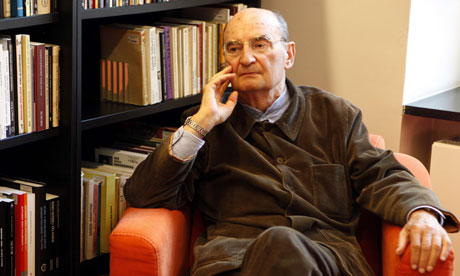
Although he spent his final years in France, and has died aged 83 in Nice, Sławomir Mrozek was always recognised in Poland as one of the country's greatest dramatists. A consistent critic of state communism from his earliest years as a journalist and cartoonist, he emigrated to France in 1968 and condemned Poland's part in the Warsaw Pact invasion of Czechoslovakia. His most famous play, Tango (1965), was a modern-day Hamlet, with the central figure, Arthur, an ironically conservative adversary of his parents' "avant-garde" lifestyle of promiscuity and complacency.
Its first British performance, translated by Nicholas Bethell, with an added polish by an unknown Tom Stoppard, and directed by an equally unknown Trevor Nunn for the Royal Shakespeare Company at the Aldwych Theatre in May 1966, was a notable component of a European season under Peter Hall's artistic direction which included plays by Peter Weiss, Marguerite Duras and Friedrich Dürrenmatt, as well as the Peter Brook anti-Vietnam war production, US.
Nunn had been hoping to present Stoppard's Rosencrantz and Guildenstern Are Dead in an RSC studio season, but when the finance fell through, the play went to an Oxford student group and then the National Theatre; in the hiatus, Nunn had encouraged Stoppard to "improve the dialogue" in Mrozek's play two weeks before it opened.
Mrozek's philosophical comedy therefore appeared with odd pre-echoes of Stoppard's later plays. Nunn himself had to take on the leading role when Dudley Sutton was indisposed (Michael Williams stepped in a few weeks later) before moving up to Stratford-upon-Avon and making his name overnight with a stopgap production of Middleton and Tourneur's The Revenger's Tragedy in October.
Although no more of Mrozek's plays made an impact in Britain, he was identified by the critic Martin Esslin (an adviser to the RSC in those days) as a key figure in a tradition of political surrealism that had existed since before the war and led directly to the extraordinary post-war Polish theatre of directors such as Konrad Swinarski, Andrzej Wajda (who directed Mrozek's second most popular play, The Emigrés, in Kraków in 1975) and Jerzy Grotowski.
This wave of Polish theatre, heralded in London by Tango, and hailed by Esslin and the Polish critic Jan Kott, had a great impact throughout Europe, not least in Peter Daubeny's World Theatre Seasons, also at the Aldwych Theatre. Kott had said in 1965 that while Mrozek's playwriting predecessors Stanisław Ignacy Witkiewicz and Witold Gombrowicz were ahead of their time, Mrozek had arrived "right on time on both clocks, the Polish and the western".
The surrealist theatre of eastern European writers such as Eugène Ionesco and Arthur Adamov who wrote in French instigated an important debate, and contrast, with the social realist theatre of Bertolt Brecht and his followers; but writers such as Mrozek (and, later, Václav Havel in Czechoslovakia) clearly wrote political, critical allegories cloaked in absurdist comedy.
Tango was about the destruction of values and the assumption of power by the vulgar masses. The play ends with a tango – symbol of what the original impulse to revolt was about – being danced over Arthur's dead body by his own father and uncle. The cyclical nature of power, and the failure of ideology, were not the sole province of communism; and Tango was, said Esslin, "brilliantly constructed, full of invention and extremely funny".
Mrozek was born in the rural town of Borzecin, east of Kraków, to which city the family moved when his father, a postal worker, was appointed there. His subjects at university were architecture, art history and oriental studies, and he worked as a political journalist during the Stalinist era, becoming a member of the Polish United Workers' party.
In his first published play, The Police (1958), an obviously Kafkaesque satirical parable, people ended up arresting each other in a parody of the Stalinist terror in Poland. Mrozek managed to survive in the system because his attacks on totalitarianism were indirect, but in 1963 he defected to Italy, and later France, with his wife Maria Obremba (also known as Mara), whom he had married in 1959. In 1978, he took French citizenship.
His output of plays and short stories was prodigious. In 1984, after the military crackdown in Poland three years earlier, he wrote the only play he ever regretted, Alfa, which defamed the imprisoned Solidarity leader Lech Wałesa, who in 1990 became president of Poland. But Mrozek's popularity was undented and he returned to Poland, living in Kraków, in 1996 before returning once more to France in 2008.
In 2010, Penguin published 10 central European classics, including a 1957 collection of stories, The Elephant, by Mrozek; reviewing this volume in the Guardian, Nicholas Lezard said he was delighted by a series of absurdist parables that were "by turns hilarious, unsettling and enigmatic".
On a book-signing tour of Katowice, Warsaw and Kraków last year, a visibly moved and surprised Mrozek, a kindly, frail figure in spectacles and a flat cap, was greeted by large crowds of mainly young people for whom he remains an important and exemplary voice.
Maria died in 1969, and Mrozek is survived by his second wife, Susana Osorio, whom he married in 1987.
• Sławomir Mrozek, playwright, born 29 June 1930; died 15 August 2013
• This article was amended on 27 August 2013. The original stated that Mrozek married Maria Obremba in Mexico, after his defection, and that he emigrated to France in 1963. This has been corrected.

